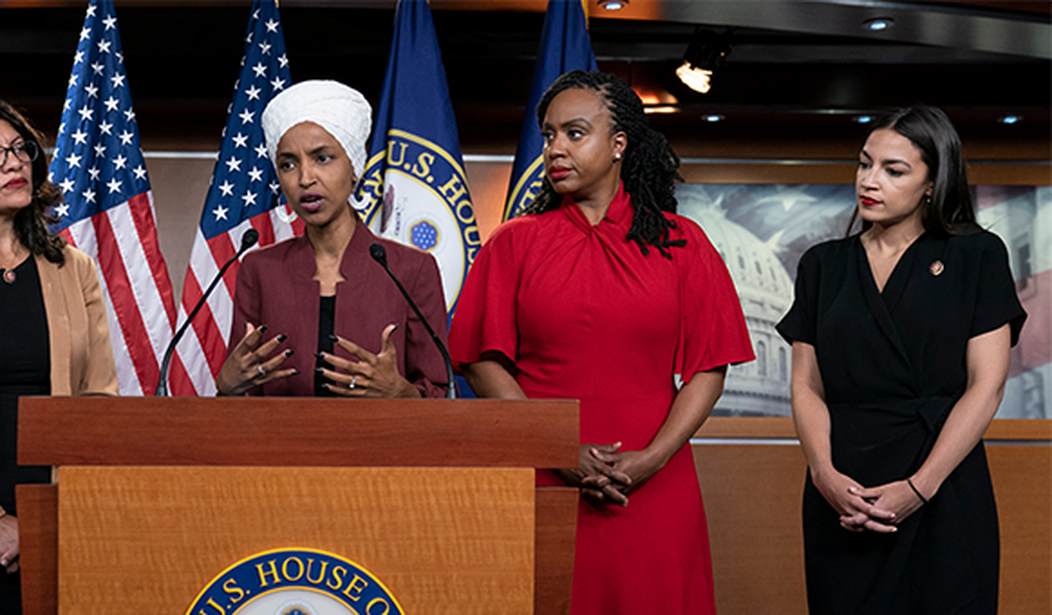I chuckled at Karol Markowicz's reaction to this story, in which she declared herself excited to hear whatever new term leftists will come up with as their preferred label. Indeed, they finally jettisoned "liberal" when they decided it was too politically toxic, shifting instead to "progressive" in recent years. Alas, they're no longer excited about that word either, so perhaps it's back to the drawing board for a new euphemistic moniker that both makes them feel good and doesn't automatically send moderate and swing voters sprinting in the opposite direction:
They’re pushing for environmental reforms, embracing single-payer health care and calling for more government assistance. But increasingly, many are reluctant to call themselves “progressives.” Left-wing candidates from Pennsylvania to North Carolina to Missouri are shying away from the P-word on the campaign trail, in messaging and online fundraising, and even in media blitzes, signaling an attempt to rebrand their wing of the party as Democrats debate how to win the midterm elections. On paper, many mesh with Capitol Hill’s top leftists. Some support easing the country’s reliance on fossil fuels and restarting discussions around “Medicare for All.” ... Their hesitation to be defined as such, however, is new...While some high-profile contenders still use the moniker, others want to be thought of in different terms. Pennsylvania’s Lt. Gov. John Fetterman, who’s seeking the party’s nomination for a coveted Senate seat, prefers a different word: populist. He’s not alone. Veteran Lucas Kunce, who’s also angling for a Senate primary win in the race to replace retiring Republican Sen. Roy Blunt in Missouri, similarly identifies as a populist and says he’s part of a “people-powered movement.” His fundraising page offers a variety of credentials: Marine, antitrust advocate and Democrat — but not progressive. Former North Carolina state Sen. Erica Smith, who suspended her Senate bid in November to instead try to replace retiring Rep. G.K. Butterfield (D) in the House, is using the term “New Deal” to describe her place within the party.
Recommended
Ultimately, they can "rebrand" all they want. It's not the word or label that is the fundamental problem, but rather the policies attached to whatever the word or label may be. As National Journal's Josh Kraushaar points out, several Democratic Senate frontrunners in key races are from the progressive/name TBA wing of the party. No one knows how things will shake out more than half a year from now, but Republicans in places like Wisconsin and Pennsylvania will certainly be eager to highlight some of the positions of leftwing candidates if they become general election nominees:
Wisconsin Lt. Gov. Mandela Barnes, the early front-runner for the Democratic nomination for Senate, is a Green New Deal-supporting, single-payer health care-backing, cash-bail-opposing candidate championed by Sen. Elizabeth Warren. He started out with a sizable lead in the primary but is facing two opponents who are beginning to spend their own personal wealth on campaign ads. Pennsylvania Lt. Gov. John Fetterman isn’t calling himself a progressive in this campaign, but he was a 2016 Bernie Sanders backer and he supports Medicare-for-all. He doesn’t look like a typical politician, with his tattooed 6-foot-8-inch frame and preference for casual clothing even at formal events. But with just two months before the Democratic primary, he holds a significant lead in polling over the more-moderate Rep. Conor Lamb even without much institutional support within the Democratic Party.
...Fetterman and Barnes both command strong support from important factions within the party...Without intervening, party leaders risk unpleasant surprises in the general election, in what’s shaping up to be a very favorable political environment for Republicans. In Pennsylvania, a pro-Lamb super PAC commissioned polling last month that showed Republican candidate David McCormick leading Fetterman by 3 points—a notable deficit in a battleground state, given Fetterman’s higher political profile. The deficit grew to 12 points after testing negative messages tagging him as a radical. (The super PAC didn’t disclose how Lamb fared in the general-election matchup.) The same poll found Fetterman with a 30-point lead over Lamb in the Democratic primary. Wisconsin polling shows that Barnes is still largely undefined in the eyes of voters—well over half respondents in a February Marquette Law poll hadn’t heard of him—but his decision to embrace controversial causes is likely to damage his general-election prospects if he’s the Democratic nominee.
"His continued support of ending cash bail for criminals is politically mystifying, especially coming after the revelation that the Waukesha Christmas parade murderer had been released on a mere $1,000 bail just five days before mowing down parade-goers. With rising gas prices becoming a top political issue, Barnes’s embrace of the Green New Deal could also be a political problem," Kraushaar writes, in an admirable piece of understatement. Democrats have finally realized how damaging "defund the police" was, even as large elements of their base still believe in the idea – which, it must be said, was indulged by Joe Biden and Kamala Harris during the 2020 campaign, when anti-police sentiment was briefly popular, amid violent rioting and unrest. All of the backtracking they've done, including public boasts that the president's new budget increases law enforcement funding, gets undermined if Democrats run radically soft-on-crime statewide candidates in swing states. In Wisconsin, the ads would write themselves, in light of the horrific incident mentioned above.
"Medicare for all" has failed to pass, even in the bluest states in the country, despite overwhelming Democratic control. See Vermont. See California. See its demolition in a Colorado referendum. Single-payer healthcare would uproot and make illegal the private insurance arrangements of many tens of millions of Americans who are overwhelmingly satisfied with their existing plans. The concept sometimes polls decently and is popular on the left, but once the practical realities enter the picture, it becomes a huge liability. And if gas prices and inflation remain painful for voters by the fall, imagine being attached to the Green New Deal's ludicrous, ruinous framework, of which Senate Democrats wanted no part when forced to vote. In a red-tinted electoral cycle, imagine the potency of a GOP commercial that credible says: "The Democrat in this race wants to cancel your health insurance, massively increase energy costs, and let violent criminals back on the street with no bail." The Squad, pictured above, would be like, "sound good to us," while happily embracing the P-word. Others, not so much.
Progressives, or whatever they want to be called these days, are also pressing the Biden administration to end "Title 42" expulsions of illegal immigrants, and the White House is reportedly poised to comply with their demands. They know it'll be a total mess, making an already-terrible border crisis even worse:
White House: We're planning for an influx at the border when CDC repeals Title 42.
— Katie Pavlich (@KatiePavlich) March 30, 2022
Crossings at the southwest border have been peaking again in recent weeks, and homeland security officials are bracing for those numbers to rise much higher if the Biden administration decides to lift a public health order that has limited immigration during the pandemic. A decision about the order, put in place by the Trump administration two years ago this month, could come as early as Wednesday, when the Centers for Disease Control and Prevention may decide whether to renew it for another 60 days. Homeland security officials on Tuesday described contingency plans for managing as many as 18,000 encounters a day at the border, regardless of the cause.
Eighteen thousand per day. This is what "progressives" want. I'll leave you with this:
.@AOC thinks President Biden got played by Joe Manchin — and that the president’s nostalgia for a bygone era of backroom dealmaking could prove disastrous for Democrats in the midterms. @errollouis reports https://t.co/WdjhV6XCdI
— New York Magazine (@NYMag) March 29, 2022
























Join the conversation as a VIP Member